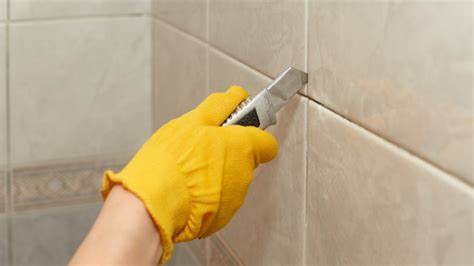Grouting is an important step in any tiling project, and it’s essential to choose the right type of grout for your specific needs.
Two popular types of grouts are urethane grout and epoxy grout, each with its own advantages and disadvantages that you must consider before making your decision on which one to use in your project.
We’ll compare urethane grout vs. epoxy grout in this article so you can make an informed decision about which one is best for you.
Contents
What is Urethane Grout?
Urethane grout is a type of pre-mixed, ready-to-use grout that contains polymers and other additives.
It has a thick consistency that allows it to be used in tight joints or corners.
Urethane grouts are usually available in a variety of colors, making them perfect for creating colorful designs or patterns on floors or walls.
They are also resistant to water, stains, and mildew, making them ideal for wet areas such as showers and bathrooms.
What is Epoxy Grout?
Epoxy grouts are also pre-mixed but have a much thicker consistency than urethane grouts.
They contain epoxy resins, which make them extremely durable and strong.
Epoxy grouts are usually available in neutral colors like white or gray but can be tinted with special pigments to create unique color combinations.
They are also resistant to water, stains, mildew, and heat, making them perfect for high traffic areas such as kitchens or commercial spaces.
Advantages of Urethane Grout
The main advantage of urethane grouts is their ease of use; they don’t require any mixing prior to application and can be applied directly from the container without any additional preparation.
They also come in many different colors, so they can be used to create unique designs or patterns on floors or walls.
Finally, they are highly resistant to water, stains, mildew, and other forms of damage, which makes them perfect for wet areas such as bathrooms or showers.
Disadvantages of Urethane Grout
The main disadvantage of urethane grouts is that they tend to be weaker than epoxy grouts when exposed to high levels of traffic or pressure.
This makes them less suitable for high-traffic areas such as kitchens or commercial spaces where durability is key.
Additionally, urethane grouts may not bond as well with some surfaces, so it’s important to test the compatibility before applying it over large areas.
Finally, urethane grouts may not last as long as epoxy ones since they can shrink over time due to exposure to water or moisture if not properly sealed after installation.
Advantages of Epoxy Grout
The main advantage of epoxy grouts is their strength.
They are much more durable than urethane ones when exposed to heavy traffic or pressure, so they are better suited for high-traffic areas such as kitchens or commercial spaces where durability is key.
Additionally, epoxy grouts come in many different colors, so you can create unique designs or patterns on floors or walls just like with urethane ones but with added strength and durability.
Finally, epoxy grouts last longer than urethanes since they don’t shrink due to exposure to water or moisture if properly sealed after installation.
Disadvantages of Epoxy Grout
The main disadvantage of epoxy grouts is their difficulty in application; unlike urethanes, which require no mixing prior to application, epoxies need careful measuring and mixing prior to application, which adds time and complexity to the project (although there are now premixed versions available).
Additionally, some surfaces may not bond well with epoxies, so it’s important to test the compatibility before applying it over large areas, just like with urethanes earlier mentioned.
Finally, epoxies tend to cost more than other types due to their extra strength and durability.
Comparing the two types of Grouts
When comparing both types side by side, it’s clear that both have their pros and cons depending on what kind of project you’re working on.
For example, if you’re looking for something quick and easy, then urethane would be best suited, while if you’re looking for something stronger and more durable, then epoxy would be a better option.
Ultimately, the choice between these two depends on what kind of job you’re doing and what kind of results you want from your project.
Conclusion
In conclusion, both urethane and epoxy have their own advantages and disadvantages depending on the kind of job you’re doing.
Ultimately, you should consider all factors before deciding which one will work best for your particular project.
Both will provide great results if installed correctly, but ultimately, it’s up to the user to decide which one you want to use based upon budget, time frame, and desired outcome.






